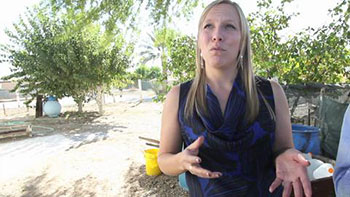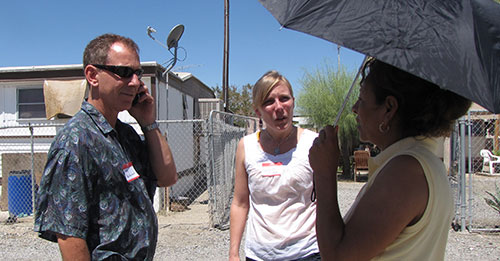By Elizabeth Zach, RCAC staff writer

It seemed like the whole town turned out when community leaders held a ribbon-cutting ceremony at the San Jose Community Learning Center in Thermal, Calif., in January to draw attention to water bottle filling station installations. There were young men clad in blue jeans and cowboy hats, an elderly woman with wizened skin and her hair pulled back in a tight bun, as well as her granddaughter, prettied up in a pink and white taffeta dress.
There was also a conspicuously blond woman in the room, toting her baby daughter in one arm and outstretching the other to shake the residents’ hands. Megan Beaman seemed to know everyone. She’s not a farmworker, but clearly, she was in her element.
Since 2008, when she graduated from the University of Wisconsin’s law school, Beaman has lived in the Coachella Valley and has dedicated herself, wholeheartedly, to bringing affordable and sustainable housing to regional farmworkers living across California’s Coachella Valley.
Beaman was aware of community organizing history and, in particular, was drawn to how the immigrant workforce fuels corporate and industrial farming.
From a distance, she seems to hail from a comfortable middle-class background and to have had enviable privileges. She has a quick smile and a quiet and pleasant manner, seemingly unfettered by life’s inevitable disappointments or suffering. But in fact, having grown up poor on an Iowa farm, she says she feels right at home where she is now.
“My parents and grandparents farmed a small family farm and went through the farm crisis of the 1980s,” she says. “They didn’t go bankrupt, but they really struggled to make a living and they were constantly getting screwed. That’s when I made observations about the inequities I saw around us.”
In the years she’s been in California practicing law, Beaman has gradually and, it seems, unwittingly, made a name for herself as the “go-to” person on all rural housing matters. She was an attorney on the infamous Duroville mobile-home park case in 2008, which she says shaped and refined her focus on lobbying for better farmworker housing. She has also taken on labor law, eviction cases and immigrants’ rights.
“When I studied law, I thought a lot about how people think and act about race, and I saw law as a way to look at this dilemma,” said Beaman, adding that she was aware of community organizing history and, in particular, was drawn to how the immigrant workforce fuels corporate and industrial farming.
Beaman started out working for the nonprofit California Rural Legal Assistance.
“They asked me if there was a field I wanted to work in,” she recalls. “I in turn asked them what they needed.”
Her first cases were diverse because the needs were diverse. “My cases involved everything from someone who was being wrongfully evicted, to someone trying to fill out a public benefits application.”
One case in particular sticks with her. A farmworker gradually became disabled through her work in the fields, until the employer told her she was no longer employable, and he fired her, says Beaman. “We went to court and we fixed it,” she says rather matter-of-factly, but still betraying pride.
Then came Duroville.
Some 400 trailers in this dusty hamlet near Palm Springs were home to an estimated 6,000 farmworkers who pick grapes and pull up onions in triple-digit temperatures, or else commute to service jobs in Palm Springs or Rancho Mirage. There was no sewage save for plastic pipes bound by duct tape, and dirt roads would melt into mud when it rained. Wild dogs roamed the alleys.
“There are thousands of people living in substandard mobile-home parks because there are no other options.” ~Beaman
In 2009, federal Judge Stephen G. Larson ruled that Duroville’s conditions were approaching humanitarian crisis proportions, such that residents should be relocated “with all deliberate speed.” Riverside County officials planned to use redevelopment funds to attract builders to create a new mobile-home park but then a double whammy hit the project. In 2010, federal financing for the mobile-home park fell through, and then Gov. Jerry Brown shut down California’s redevelopment agencies, arguing that their money often went to flimsy projects.
In response, Riverside County Supervisor John Benoit said, “You can’t possibly look at this and say that it’s not a good use of money. Everyone has to live somewhere. People deserve basic services just like everyone else.”
Beaman was among dozens of attorneys who advocated for the farmworkers. They argued that the park shouldn’t necessarily be closed—if no new housing was being built for the residents, they would have nowhere to go—but rather that the landowner should better maintain the park conditions.

The court eventually agreed to allow the park to stay open until new housing could be built. After some time, a new housing development, called Mountain View Estates, was built with existing county-managed redevelopment funds. But because there were fewer units in Mountain View Estates than in Duroville, not all Duroville families were able to move into the new housing. “It was a net loss of housing stock,” says Beaman, who sees Duroville as reflecting a more complex issue.
“No doubt about it, this was a huge victory for farmworker housing,” says Beaman. “But I see it somewhat differently in that the conditions were so bad that many people just left and we have no idea where they went. In other words, there’s a much larger problem here that wasn’t in any way solved by this lawsuit.”
Moreover, the Duroville case highlights Beaman’s intense interest in a subset of the population that has been even more overlooked in the most recent economic downturn.
“The cases that most interested me are those indigenous farmworkers from Mexico, many of whom are undocumented workers, a double category, so to speak,” she says. “They face double discrimination. These are the types of clients I love to work with.”
“I love my work. It can be so exhausting and frustrating and you sometimes feel like it will never end. You wonder if you’re making an impact.” ~Beaman
She is remarkably even-handed in talking about the landowners where the farmworkers live.
“There are thousands of people living in substandard mobile-home parks because there are no other options,” she says. “You can look at the owners as bad actors, but the fact is, they are meeting a huge need and maybe make a little money at it. The real problem is that we simply don’t have enough affordable housing, so people are looking at what they can do.”
The hamstrung redevelopment agencies, she adds, compound the problem.
“I know that in some areas, these funds were used to build tennis courts and that’s perverse,” she says. “What are we going to do now? Well, the Eastern Coachella Valley community is very innovative at finding their own solutions. We’re focusing a lot of our attention on rehabilitating the existing housing stock.”
That Beaman can work diligently on a piece of the puzzle, step-by-step, is a skill that hasn’t gone unnoticed by her colleagues. Ron Javor, a retired attorney who worked with Beaman on the Duroville case and other housing issues, says it’s this pragmatism that has helped save the day for many.
“The one big break in these things usually ain’t gonna happen,” he says, “whether it’s an employment or housing problem. Megan looks for and pursues incremental improvements and resources to help her clients. She’s extremely capable at creating alliances that benefit her clients.”
It helps, too, that politically there’s been some progress. With the Coachella Valley’s division – the eastern portion being far poorer than the western half – Beaman says there has been better representation in recent years, including a recent landmark change with respect to water issues.
“For 16 years, these residents were complaining to the water district to get clean water,” says Beaman, adding that many have to rely on their own wells, “and they asked us what we could do about the lack of responsive representation on the board of the Coachella Valley Water District.”
What Beaman and her legal team found, she says, violated California’s voting rights act. To overcome this, she educated residents on the issues and led them through a legal challenge to the Board’s electoral system. Now, all the Board members are more accountable to the voters in their districts.
One would think that with all Beaman has on her plate now, that she can’t take on any more. That is probably right but you would never know it.
“You can reach her any time of the day,” says Javor. “She is very committed to economic as well as social justice and is a very effective advocate. She has tremendous follow-up ability and she’s held my own feet to the fire on stuff we work on together.”
“I love my work,” says Beaman. “It can be so exhausting and frustrating and you sometimes feel like it will never end. You wonder if you’re making an impact. But you do the best you can, and this is my piece of that.”
